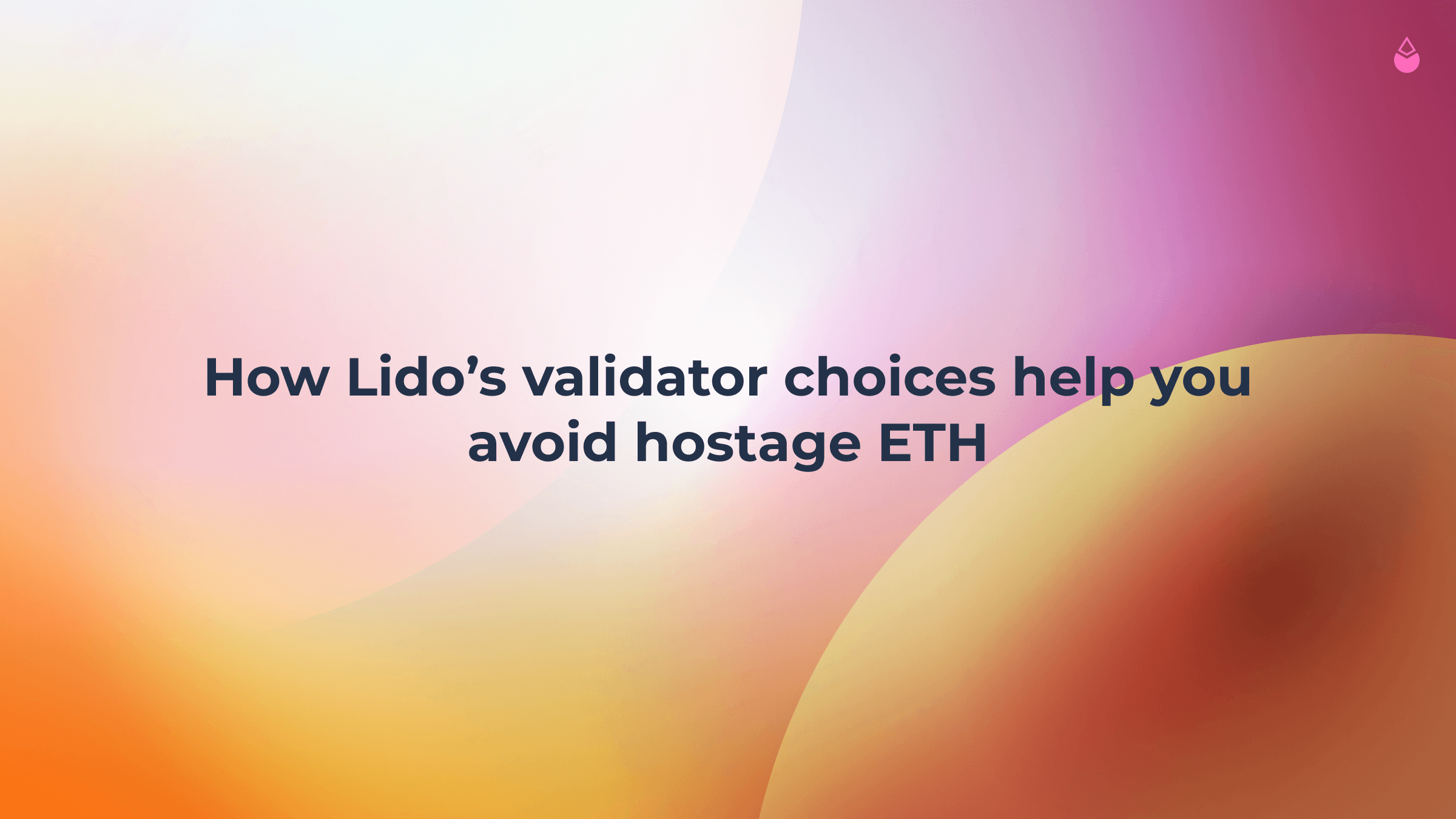How Lido’s validator choices help you avoid hostage ETH

As we approach the launch of ETH 2.0, the significance of network validators is becoming more and more apparent. Validators - those who manage staking nodes across ETH 2.0 - are faced with a difficult task which, if not managed thoroughly, can have negative consequences for ETH stakers.
It’s important that when you stake ETH, you select a professional and reputable node operator. There are two main risks associated with selecting a node operator:
- Hostage years
- Slashing risk
We’ll discuss both shortly. These risks important considerations for the validators that will act as the backbone of Lido too.
Lido is an ETH 2.0 staking solution that provides a tokenised version of your staked ETH while you are staking. This tokenised stETH is compatible with DeFi and allows you to simultaneously stake ether while also participating in on-chain lending or trading.
Lido will maintain a set of node operators who are responsible for validating the ETH staked with Lido. The addition and removal of node operators will be voted on by Lido community governance.
When you stake with Lido, your ETH is staked with an operator within the set. This is chosen through a round-robin allocation based on the remaining availability within each validator’s slot. If you stake more than 32 ETH, it’s possible that your ETH is staked with several different validators in the set.
Lido’s founding operators will be voted on by community governance in the next couple of weeks. Companies like Certus One, Chorus One, p2p.org, StakeFish, Staking Facilities and many more have indicated interest in becoming the initial operators on Lido, which Lido community governance can vote to accept, and many more of the leading validators across Cosmos, Polkadot, Solana, and others have indicated strong interest. Such high-quality operators would provide a strong backbone for Lido.
The reputation and historic record as the best-in-industry of those interested in being operators is important because they are responsible for validating the ETH in Lido. These characteristics are equally important when selecting a node operator if you plan to stake elsewhere.
Diving into the details of those risks.
The hostage years (or “out of business” risk)
Since it may take months to years for transactions to be enabled on ETH 2.0 - during which time it is impossible to move ETH - the operator you choose to stake your ETH with is exceptionally important.
You must have confidence that they are still going to be operating one or two years in the future.
Since your ETH is locked and unmoveable, it won't be possible to re-delegate or switch to another operator in case the one you chose goes out of business. If your chosen operator is a hobbyist, or perhaps a new and unproven organization, and it stopped validating after a few months, your ETH would be stuck earning no rewards until transactions are enabled.
For Lido, it is important to only allow professionals that have a reputable history and are very likely to still be doing business up until transactions are enabled on ETH 2.0.
Incentives are aligned with these operators. They are part-owners of Lido, and their rewards are paid in real-time in stETH.
Slashing risk
ETH 2.0 is not well suited for amateur validators. There are several reasons for this, the main being that slashing and offline penalties can get severe if they were to happen across multiple validators simultaneously.
Slashing is a penalty in which a validator forfeits a proportion of their staked tokens due to node downtime or double-signing. The risk of slashing, combined with the fact the software is unpolished, migration between clients is difficult, and a minimal deposit of 32 ETH being a sizable sum to risk for most of us, all means that staking Ethereum has a risk/reward ratio which is, in our view, only acceptable to professionals.
This is another reason why it’s important for Lido’s operators to be highly reputable and with a history of good performance in staking. Lido should, in principle, aim to only work with operators that can maintain the high levels of security and performance.
Of course, this may not be enough. Slashing can still happen. In that instance, there are many things Lido can do to prevent the downside from slashing risk.
- Lido could socialise the slashing loss to all users in order to reduce individual impact.
- Lido could leverage existing risk capital pools to buy slashing cover from, for example, Nexus Mutual or Shield DAO.
- Lido could maintain its own insurance fund to cover slashing penalties directly.
Lido’s Founding Node Operators
A liquid staking protocol is only as good as its node operators. It is great to have such reputable founding operators willing to participate in Lido. To signal your interest in joining Lido as a validator, please get in touch with us.